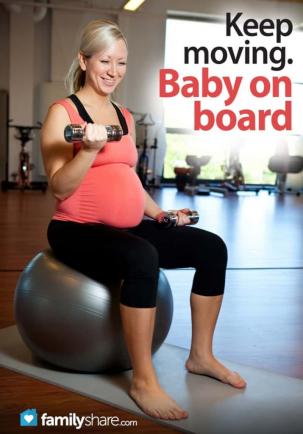
The thinking about exercise during pregnancy has changed. The American College of Obstetricians and Gynecologists (ACOG) published a very helpful FAQ covering their latest recommendations. Gone is the recommendation of keeping your heart rate below 150 beats per minute. Running is no longer off-limits for those who ran before pregnancy. Practitioners are encouraging moderate exercise during pregnancy. You may be tempted to give yourself a break and relax during pregnancy. However, read on for motivation to keep moving.
There are many reasons to exercise during pregnancy. Regular exercise will help you maintain muscle tone, keep you in shape for delivery, help avoid back pain, lower stress, keep energy levels higher, keep weight in check, and reduce your risk for pregnancy-induced high blood pressure and gestational diabetes. An exercise routine might also help combat post-partum depression, according to The Mayo Clinic.
ACOG recommends 30 minutes of moderate exercise on most days. If you are new to exercise, start with 5-10 minutes and build stamina slowly.
Swimming is often called the best exercise for pregnant women. The water feels therapeutic, joints and muscles aren't overly strained, and your heart gets a workout without your body overheating. Flip turns might have to be given up at some point, but you can safely swim throughout pregnancy.
Walking is an activity most people can do, including expectant mothers. Wear loose-fitting clothing and supportive shoes. Make sure to stay hydrated and walk at a comfortable pace.
Running can be safely done throughout pregnancy but isn't recommended for beginners. Consider a maternity belt to support your abdomen. Be careful of uneven surfaces or wet conditions as to avoid a fall. Switch to walking, or alternate walking with running, if you feel tired or sore. Anticipate slowing down.
Yoga can build strength and be relaxing. If you are not doing prenatal or gentle yoga, you will have to adjust your practice for your changing body. Avoid Bikram, or hot yoga as the high temperatures aren't safe for you or baby. Be careful during poses that twist, and avoid lying flat on your back or your belly.
Cycling, stair-climbing machines, elliptical trainers, moderate strength training, aerobics and dancing can all be continued while pregnant. Be aware of how you are feeling and don't overdo it. Drink water before, during and after exercise and give yourself time to warm up and cool down.
Exercises to be avoided are those that are high-risk and high-impact. Examples include snow and water skiing, scuba diving, rock climbing, hiking at high altitudes, and contact sports like hockey, soccer, and basketball.
If you experience complications during your pregnancy, follow your doctor's recommendations for exercise. There are several other conditions that warrant rest, including high blood pressure and placenta previa. While pregnant with my third child, I ran until I was placed on moderate bed rest at 26 weeks for preeclampsia. You should stop exercising and notify your doctor if you experience strange symptoms like dizziness, shortness of breath, chest pain, abdominal pain or unexpected bleeding.
The goal of pregnancy is to end up with a happy and healthy mother and baby. Exercise during pregnancy can contribute to that outcome. You might have to ask someone else to tie your shoes, but keep moving!

